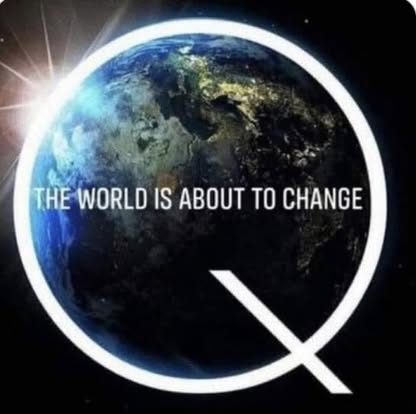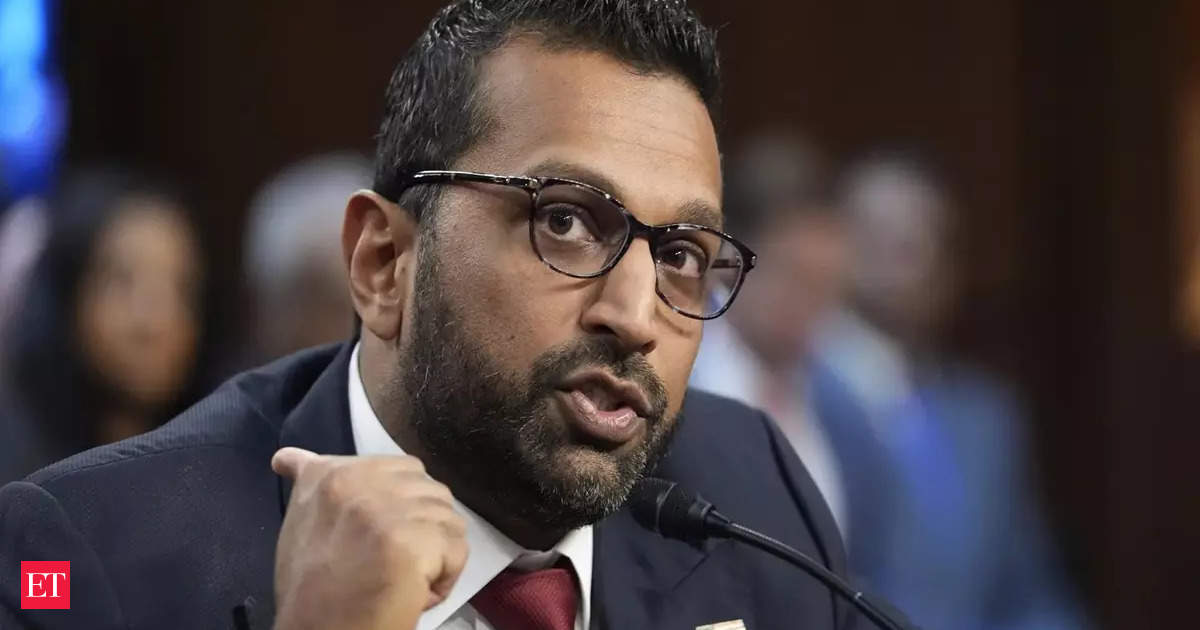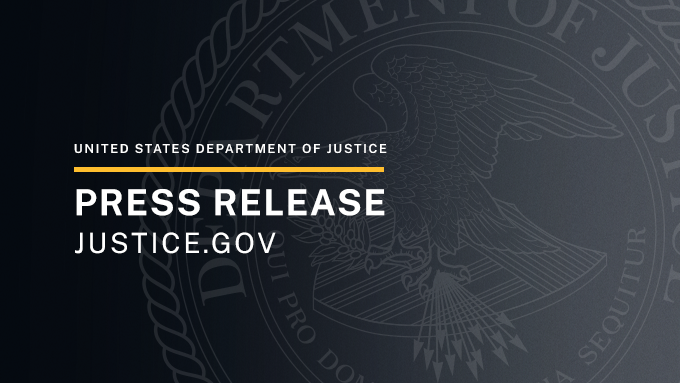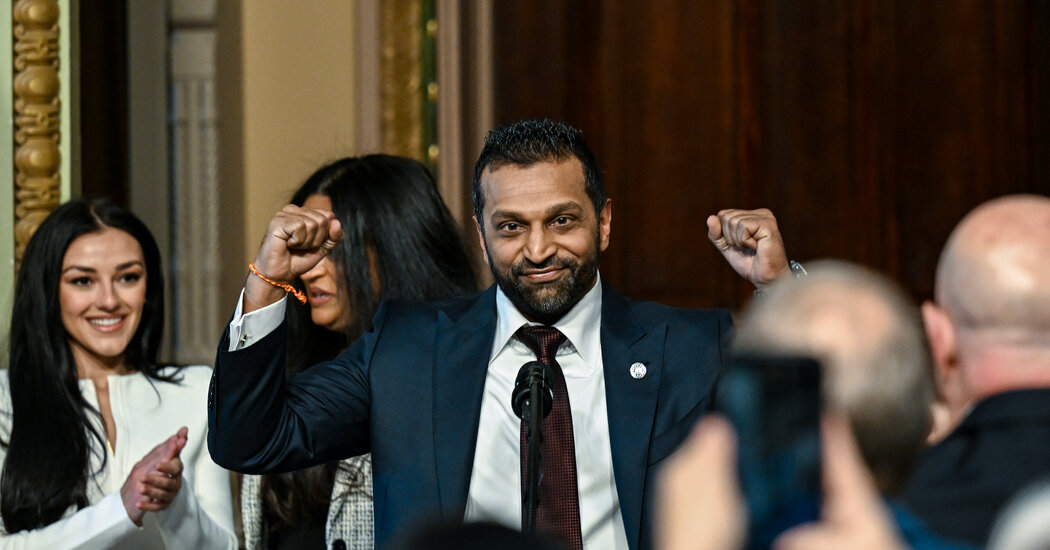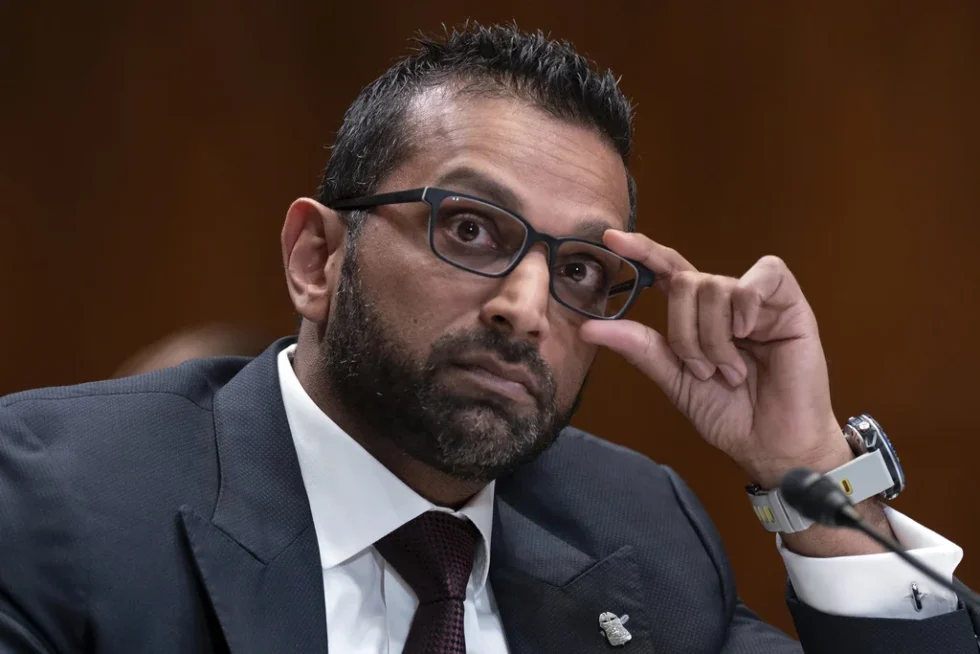
The public may soon know more about unanswered questions surrounding the Jan. 6 Capitol riot, an unexplained pipe bomb threat that day, and the state-backed effort to surveil President Donald Trump‘s 2016 campaign.
FBI Director Kash Patel and Deputy Director Dan Bongino, Trump’s picks to uproot what critics see as institutional rot in the bureau, said this week the agency is set to release batches of documents to bring about “accountability.” The pair promised there would be a “truckload” of long-withheld internal files during their pretaped appearance on Sunday Morning Futures.

“Just give us about a week or two,” Patel said.
Congressional Republicans and legal experts say critical questions remain unresolved, particularly those involving accountability for surveillance abuses, informant usage, and what role senior Obama-era officials may have played in politicized investigations. Pressure and hope are escalating over whether the bureau’s latest trove of records releases can clear up those outstanding inquiries.
Here are seven questions that remain unanswered as the FBI prepares its next public release:
1. Were there more than just FBI informants present on Jan. 6?
The Justice Department inspector general revealed in December that the FBI deployed at least 26 confidential human sources, also known as informants, in Washington, D.C., on Jan. 6, 2021.
Among them, at least four are confirmed to have entered the Capitol. House Judiciary Committee Chairman Jim Jordan (R-OH) said it remains unclear whether these informants were authorized by the bureau to be inside — and whether they contributed to building criminal cases.
“We want to know … were they the first in? Did they come in through the door? Did they come in through a window?” Jordan told the Washington Examiner on Monday. “Why have spies at an event where Americans are exercising their First Amendment liberty?”
Jordan’s committee is pressing for detailed disclosures, including how long the undercover informants were operational, who supervised them, whether they were paid for information used in prosecutions, and whether their participation influenced criminal charges brought against others.
2. What happened to the pipe bomb investigation?
More than four years after explosives were planted outside the Republican and Democratic National Committee headquarters on the eve of the Capitol riot, the FBI has not named a suspect or made any arrests. That lack of progress has sustained interest in the discovery of the pipe bombs for years.
A January report by the House Administration Subcommittee on Oversight found that the bureau “has yet to identify the individual responsible” despite early steps including surveillance reviews, search warrants, and forensic analysis of the devices. “The role [the pipe bombs] played in diverting resources away from the Capitol cannot be overstated,” the report warned.
Last week, Ed Martin, former acting U.S. attorney for the District of Columbia and now the Trump administration’s pardon attorney, told the Tucker Carlson Show that the case is active in his office.
“Bongino said to the FBI, ‘Change all the agents. Everybody look at it again,’” Martin recalled, suggesting that new leadership has reopened the investigation with a clean slate. He pointed to possibly overlooked suspects and raised the question of whether the lack of progress reflected incompetence or something more intentional.
Martin’s comments signal that the Trump administration is prioritizing the investigation, which he says has suffered from years of evasive responses and bureaucratic inertia.
Bongino, who built a multimillion-dollar media career before accepting his new role as No. 2 in the FBI, said just weeks before assuming the post that he believed the FBI knew the identity of the pipe bomber “four years ago and just doesn’t want to tell us because it was an inside job.”
During the Fox News interview released Sunday, Bongino said the public needs the FBI to “get to the bottom” of the pipe bomb case, but he did not reiterate his previous statement about who planted the bombs.
3. Who else was involved in the Crossfire Hurricane investigation?
The FBI’s 2016 counterintelligence investigation into the Trump campaign, codenamed Crossfire Hurricane, has long drawn criticism for the way FBI and DOJ officials departed from standard procedure to target Trump. The investigation led to surveillance of Trump adviser Carter Page and played a key role in the broader Trump-Russia narrative that defined the president’s first term.
While a handful of names are publicly associated with the Russia saga — former FBI counterintelligence chief Peter Strzok, FBI lawyer Kevin Clinesmith, Deputy Director Andrew McCabe, and FBI Director James Comey have all faced withering scrutiny for their aggressive or unethical tactics — legal scholars say the public has no clear picture of how many other agents and supervisors played key roles in authorizing or executing the investigation.
“We know about the big names,” said John Shu, a constitutional law scholar and expert who served in both Bush administrations. “But we don’t know who else gave permission to go ahead, wrote the memos, built the case files, or signed the applications. Are those people still working at the FBI? Have they faced any discipline?”
Clinesmith, who altered an email used in a FISA application to suggest falsely that Page had no ties to the CIA, therefore making Page’s Russian connections appear far more sinister than they really were, was later convicted of making a false statement. He received probation. No other individuals involved in the investigation at the FBI or DOJ have been criminally charged, but a lawyer working for the Hillary Clinton campaign was charged with lying to the FBI when he planted the Russia accusations with a top FBI official. That lawyer was later acquitted.
For years, Sens. Chuck Grassley (R-IA) and Ron Johnson (R-WI) have accused the FBI under previous administrations of stonewalling congressional oversight. Grassley has repeatedly asked for unredacted transcripts and internal memos related to both Crossfire Hurricane and the bureau’s handling of other politically charged cases.
“I know Director Patel has been working to enhance the Bureau’s transparency, and I appreciate his ongoing efforts,” Grassley told the Washington Examiner last week. Grassley noted that he is keeping close tabs on the current FBI to “ensure I receive complete record productions without unnecessary redactions.”
4. Did Obama-era leaders approve or direct the Trump-Russia investigation?
Though the FBI ran the Crossfire Hurricane operation, declassified documents suggest that senior Obama administration officials, possibly including then-President Barack Obama and then-Vice President Joe Biden, were aware of the investigation’s broader aims.
Notes taken by Strzok reference a briefing by then-CIA Director John Brennan to Obama in 2016 about intelligence suggesting that Hillary Clinton’s campaign planned to link Trump to Russia as a political strategy. While the notes do not directly reference the Steele dossier, a discredited set of allegations compiled by a contractor for the Clinton campaign, they have fueled Republican claims that the Obama administration was aware of efforts to weaponize Trump-Russia allegations. Separately, declassified documents show that Biden, then vice president, was among several officials who requested the “unmasking” of incoming national security adviser Michael Flynn’s name in intelligence reports.
“People suspect [Obama and Biden] may have been involved because their names appear in Strzok’s notes,” Shu said. “But we don’t know if either of them approved the operation or the targeting strategy, or just received updates. That’s a crucial distinction.”
Shu emphasized that other officials, such as former acting Attorney General Loretta Lynch and former Deputy Attorney General Sally Yates, should also be publicly named if they had decision-making authority or engaged in wrongdoing.
5. Why hasn’t anyone been held accountable for FISA abuses?
Both former special counsel John Durham and DOJ Inspector General Michael Horowitz documented sweeping errors and misconduct in the FBI’s misuse of surveillance under the Foreign Intelligence Surveillance Act — most notably, the unlawful targeting of Trump campaign adviser Page using misleading and incomplete applications.
During the Fox News interview on Sunday, Patel underscored that previous FBI leadership under the direction of Comey “manipulated the FISA process to try and rig a presidential election and then lied about it to hide the truth.”
Previous FBI leadership like James Comey manipulated the FISA process to try and rig a Presidential election, and then lied about it to hide the truth. We’re now here to clean it up and the American people are about to see a wave of transparency. pic.twitter.com/QIAPWtRChs
— FBI Director Kash Patel (@FBIDirectorKash) May 18, 2025
Yet aside from one conviction — FBI lawyer Clinesmith, who admitted to doctoring an email to suggest falsely that Page had no ties to the CIA when he had in fact worked with the CIA in the past — there has been no public accountability for other officials involved in the process.
“Generally, internal HR policies do not prohibit the public release of names or disciplinary action,” Shu said. “Because these cases are very much in the public interest, if someone was fired or demoted, the public has a right to know.”
Trump administration officials have pointed to high numbers of retirements and departures from senior ranks at the bureau as a signal that internal changes are underway, though few names have been publicly confirmed.
In a recent post on X, Bongino said, “I aggressively responded because the Director and I have been working tirelessly to uncover the bad actors. We cannot get into HR specifics, and this creates an information vacuum.”
Still, without clarity on who left and why, the bureau’s pattern of shielding personnel decisions under the umbrella of “HR” could be viewed by critics as an insufficient level of transparency.
6. Who approved memo targeting Catholic churches for surveillance, and were they disciplined?
The FBI’s Richmond memo, revealed in August 2023, proposed placing confidential human sources inside traditionalist Catholic organizations to monitor for signs of extremism. The FBI later disavowed the memo, and then-Director Christopher Wray testified that the agents involved had been “admonished,” though none were removed.
Shu said that isn’t sufficient to prevent such wrongdoing from happening again.
“It is unconstitutional for the FBI to target or surveil American citizens based on their religion,” Shu told the Washington Examiner.
“Leftists also should be upset; how would they feel if the FBI wrote that memo about traditional Islamic organizations or mosques? That memo never should have been written, and someone at the FBI should have been fired for it,” Shu added.
Additional documents obtained by the House Judiciary Committee showed that multiple FBI field offices contributed to the memo, raising further concerns about how widespread the mindset behind it was and who ultimately approved it.
Meanwhile, the DOJ has taken separate actions that suggest it is working to protect religious rights in other contexts.
The Justice Department this month has taken two actions signaling heightened enforcement of religious liberty protections: opening a civil rights investigation into Washington state’s new law requiring clergy to report child abuse even if learned in confession, and suing the city of Troy, Idaho, for allegedly denying a land-use permit to an evangelical church due to community hostility toward its beliefs, violations the DOJ says raise serious First Amendment and RLUIPA concerns.
While those efforts show an active civil rights enforcement agenda, the real question surrounding the Richmond memo’s internal fallout and lack of firings remains a pressing test of the bureau’s current transparency standards set out under Trump.
7. Did the FBI deprioritize violence by one political extreme while elevating another?
Following the 2020 riots in cities such as Portland, Minneapolis, and Seattle, the FBI opened hundreds of domestic terrorism cases. But few involved serious charges against left-wing organizations — and many conservatives believe the bureau applied a double standard to extreme right- and left-wing violence.
One year later, after Biden became president, the National Security Council released a memorandum known as the National Strategy for Countering Domestic Terrorism that June, claiming that one of the greatest threats facing the country came from “white supremacist groups” and “anti-government militias,” while omitting any reference to the issues that led to the nationwide increase in violence during the 2020 summer of unrest.
While the memo did not suggest the Biden administration was focusing law enforcement against one political extremist faction versus another, critics worried that the administration was focusing on select forms of violence as opposed to other, more visible types.
“If someone inside the FBI wrote a memo saying, ‘We received instructions from Person A at the White House or Person B at DOJ to not go after Antifa or BLM,’ that unredacted memo should be made public,” Shu said.
“There’s no reasonable legal reason to keep something like that a secret, and at the very least, it should be turned over to the congressional oversight committees,” Shu added.
A test of transparency
With the document release looming, Bongino and Patel say they hope to restore public confidence through transparency. Bongino has rejected claims that he’s protecting legacy interests.
I haven’t done any media interviews to this point because I want to keep the attention on the work. I don’t work for myself anymore, I work for you.
But it is important to relay to you what we’re doing, and the media can be a tool for that. That’s why we chose a long-form…— Dan Bongino (@FBIDDBongino) May 18, 2025
“Unfortunately bad actors looking to tell you ‘a story,’ not THE story, want you to believe we haven’t taken harsh and decisive action,” Bongino wrote on X. “That’s absolutely false.”
KASH PATEL PREVIEWS NEW RUSSIAGATE INFORMATION WILL PROVIDE ‘ACCOUNTABILITY’
But unless the records contain names, timelines, and real consequences, experts such as Shu say the public could possibly continue to question the FBI’s credibility.
“Just say what happened, with no trickiness or evasiveness,” Shu said. “If people did something wrong, identify them and say so. If they were fired, say so. If they’re still working there, say why. Just be direct, honest, and transparent with both Congress and the American people as they promised. That’s the best way to move forward.”


